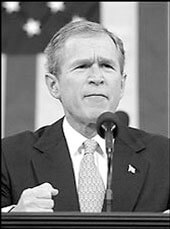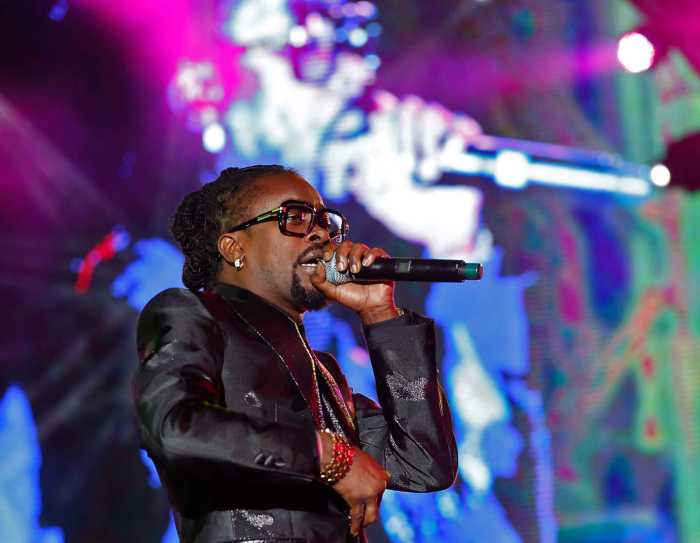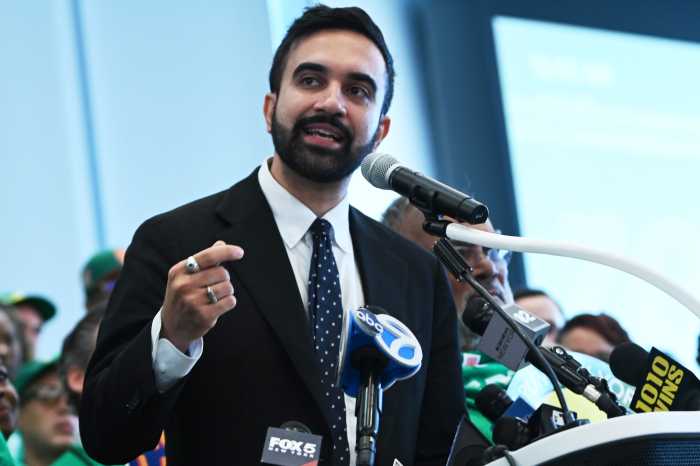President uses State of the Union to warn amendment might be necessary
In choosing the State of the Union address to articulate his opposition to same-sex marriages, Bush employed the enormous bully pulpit provided by an annual address delivered within the stately surroundings of the House of Representatives that is widely watched on TV.
With the nation sharply divided over the administration’s domestic agenda, the remarks were also an indication of the issues upon which his campaign intends to stake Bush’s re-election gambit.
Obliquely phrased as they were, the president’s words on same-sex marriage came in the latter segment of a speech that opened with the recognition that American soldiers stationed abroad are in combat and that the administration continues to wage war on a relentless foe whose persistence still requires the vigilance of Americans wary of another massive terrorist strike.
However, aside from asserting the measures his administration is taking to address issues of national security, an area where the president receives the support of a plurality of Americans, the president did not elaborate on much in his speech, leaving out mention of Osama Bin Laden, the architect of the September 11 attacks, and only briefly asserting that Iraq had indeed been intent on producing weapons of mass destruction.
The domestic half of the president’s speech, therefore, was scripted to address issues that point to his potential electoral liabilities.
While he never uttered the term “same-sex marriage,” reference to the issue came at the end of a series of paragraphs that focused on issues of morality and family.
The president repeatedly expressed concerns about America’s children.
“We are living in a time of great change—in our world, in our economy, in science and medicine. Yet some things endure: courage and compassion, reverence and integrity, respect for differences of faith and race,” Bush said, before intoning: “We must stand with our families to help them raise healthy responsible children. And when it comes to helping our children make right choices, there is work for all of us to do.”
In light of his earlier remarks about American troops serving in harm’s way, that domestic call to protecting America’s young was clearly intended by the president as an articulation of the sacrifice and struggle he perceived that citizens on American soil needed to match.
His extended remarks about children included a provision to provide new funding for drug-testing in schools, a $23 million initiative the president described as a “tool to save children’s lives.” The president called on professional athletes to stop using performance-enhancing drugs. In a line that met with applause, the president called on team owners, union representatives, coaches, and players, to “get rid of steroids now.”
Next, the president spoke of adolescents who contact sexually-transmitted diseases, stating that about three million teenagers are harmed and killed from STDs, some even rendered incapable of reproducing.
The president then underscored his oft-stated assertion that abstinence from sexual relations is the “only certain way for young people to avoid sexually transmitted diseases,” and indicated that his budget allocates money for abstinence-only sexual education classes in schools. That assertion continues to generate a backlash of opposition from AIDS services providers and educators who maintain that separating condom use from prevention efforts needlessly costs lives not only in the United States, but in Africa and Asia where the pandemic’s rapid spread has killed millions.
Following upon his abstinence message, the president then declared that “Decisions children now make can affect their health and character for the rest of their lives. All of us—parents and schools and government—must work together to counter the negative influence of the culture and to send the right messages to our children.”
The president then said, “A strong America must also value the institution of marriage,” adding “I believe we must respect individuals and take a principled stand for one of the most fundamental, enduring institutions of our civilization.”
Bush then referred to the Defense of Marriage Act, reminding that it was legislation signed in 1996 by Pres. Bill Clinton, a Democrat. Enacted during his re-election bid, the measure, a largely symbolic act on the part of Congress, requires the federal government and allows individual states to deny recognition of a same-sex marriage legalized elsewhere.
Bush stated: “That statute protects marriage under federal law as the union of a man and a woman, and declares that one state may not redefine marriage for other states.”
The president then laid out what may very be the battle lines upon which the same-sex marriage question may unfold during the general election campaign next fall when Bush debates the Democratic nominee.
“Activist judges, however,” said Bush, “have begun redefining marriage by court order, without regard for the will of the people and their elected representatives. On an issue of such great consequence, the people’s voice must be heard. If judges insist on forcing their arbitrary will upon the people, the only alternative left to the people would be the constitutional process.”
The lack of specificity in the president’s comments fulfills two objectives Bush sought to accomplish with his speech.
Ostensibly, the president’s remarks about activist judges refer to the decisions within the last three years of the high courts in Massachusetts and Vermont, both of which have instructed their respective states’ legislatures to pass legislation that allows for the legal recognition of same-sex couples.
Both of those states are home to Democrats who are leading presidential contenders.
In 2000, Vermont’s then governor, Howard Dean, signed a civil union law that, while it does not provide all the benefits of marriage, legalizes the existence of same-sex couples and set the stage for the same-sex marriage movement that emerged from its passage.
In Massachusetts, home to John Kerry, the insurgent winner of the Iowa caucuses, the Supreme Judicial Court has mandated that the legislature pass a law that opens up the institution of civil marriage to same-sex couples.
In his speech, Bush did not mention either state, nor did he say the words same-sex marriage, gay, or lesbian.
For many observers, however, the president’s intent was clear.
“The people who Bush wanted to hear that passage in the speech, they heard it,” said U.S. Rep. Jerold Nadler, a Manhattan Democrat who supports those seeking same-sex marriages. Nadler referred to notes he wrote while Bush delivered his speech. In reference to the president’s use of the term “constitutional process,” Nadler stated: “He did not endorse the Federal Marriage Amendment. He did not pick that fight right now. He’s got plenty of time.”
On Capitol Hill, lawmakers in both chambers of the Republican-led Congress have initiated the cumbersome process of amending the Constitution, introducing bills that explicitly prohibit the federal government’s recognition of same-sex marriage.
Rep. Carolyn Maloney, another Manhattan Democrat, saw a clear effort by the president to support a constitutional amendment. Maloney, whose East Side district also includes a section of Queens, issued the following written statement: “Never before has our nation sought to deny fundamental rights to an entire class of citizens by amending our Constitution. The President’s move to do just that is not only mean-spirited political pandering, it will serve to undermine basic American principles of liberty and justice for all.”
Not surprisingly, many faith-based conservative groups applauded the president’s remarks about prohibiting same-sex marriage. For months, many conservative groups have railed at the Oval Office demanding that Bush denounce those who support same-sex marriage efforts.
Throughout much of 2003, as the Federal Marriage Amendment was introduced, two Canadian provinces granted same-sex marriage rights, and the Supreme Court overturned the nation’s sodomy laws, Bush remained relatively silent on the subject of same-sex marriage. His first statement, on July 30, was relatively non-committal, saying that his legal advisors would recommend the correct course for the administration to take. Then, in a December interview with Diane Sawyer after the capture of Saddam Hussein, Bush grew more explicit, saying he would consider amending the Constitution.
Despite the evolution of the president’s position on the issue and his extraordinary use of the State of the Union speech to revisit it, his remarks disappointed some conservatives who wanted a more explicit denunciation of same-sex marriage.
Tony Perkins, head of the Family Research Council, released a statement saying, “Now is the time, before the Court of Massachusetts imposes same-sex marriage on America, to protect the sacred and irreplaceable institution of marriage.”
Perkins added, “The president should immediately call upon Congress to pass an amendment this year, codifying into law what history and nature has taught us––marriage is between a man and a woman.”
In addition to homeland security, Perkins said, Americans want President Bush to focus on the “security of the American home.”
The Empire State Pride Agenda, New York’s statewide LGBT advocacy group, issued a statement in which its executive director, Alan Van Capelle, said that Bush “had the opportunity to lift up our country and unite us around common goals. Instead he chose to play to the worst fears of Americans and divide us in the most cynical of ways during an election year.”
Van Capelle attacked the president’s use of the term sanctity to describe heterosexual marriage.
“As Brittany Spears illustrated, there is no inherent sanctity in two people just deciding to get married,” he wrote. “What is sacred is when two people in love commit to spending their lives together and forming a family.”
Joe Tarver, ESPA’s spokesperson, said in a later interview that “Bush’s remarks about activist judges and upholding the moral tenets of marriage were reminiscent of some of the rants delivered by right wing Republicans during the party convention in the summer of 1992 before Pres. Bush H.W. Bush’s re-election campaign.”
Of course, Bill Clinton went on to win that election.



































